#institute for palestine studies
Text
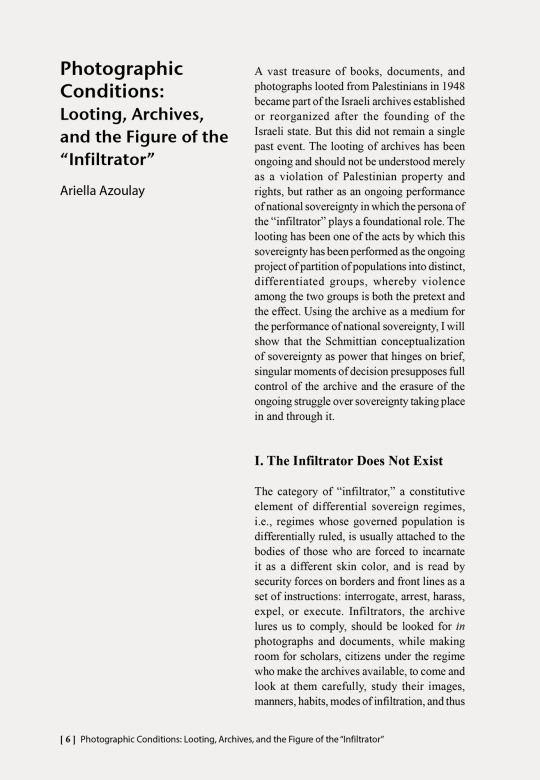
Ariella Azoulay (أريئيلا أزولاي), Photographic Conditions: Looting, Archives, and the Figure of the "Infiltrator", «Jerusalem Quarterly», Issue 61, Winter 2015, pp. 6-22 (pdf here) [Institute for Palestine Studies, Beirut]
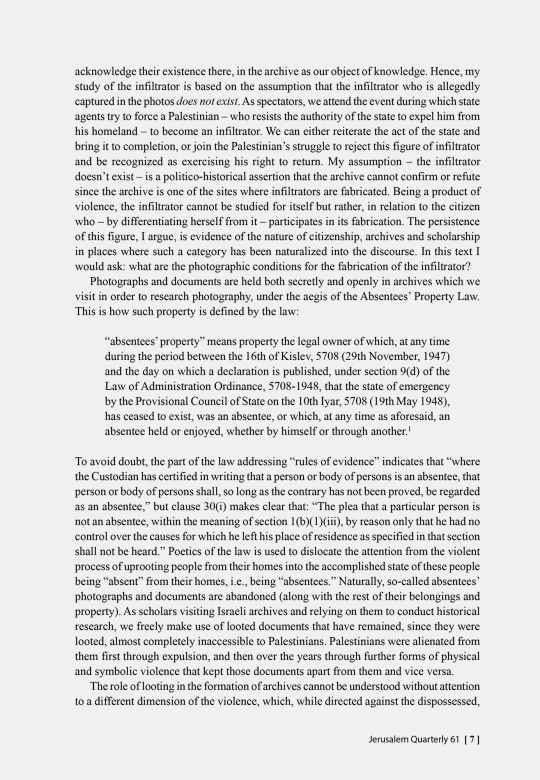

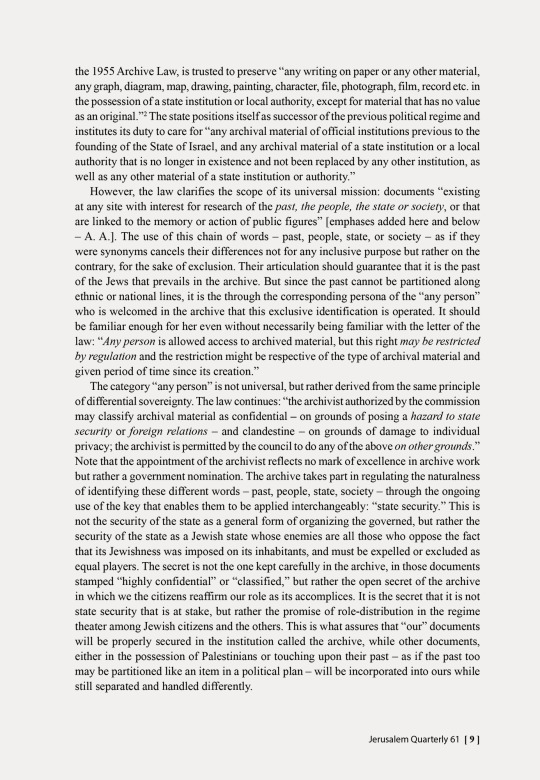
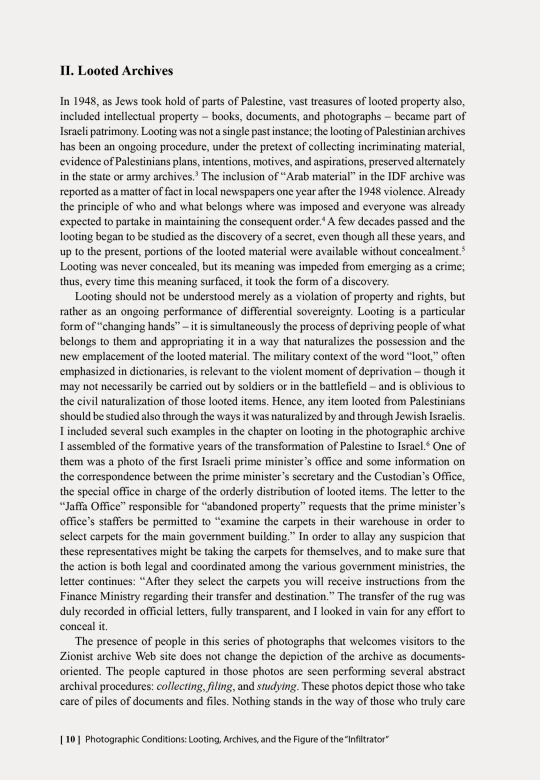

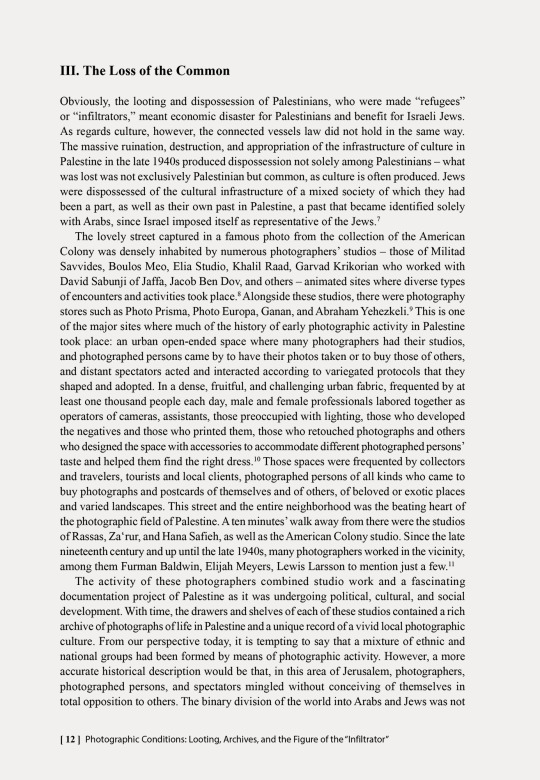

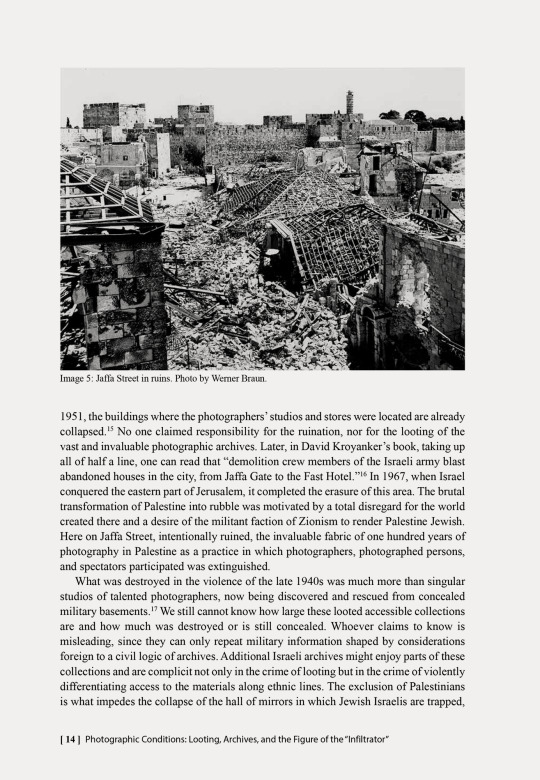


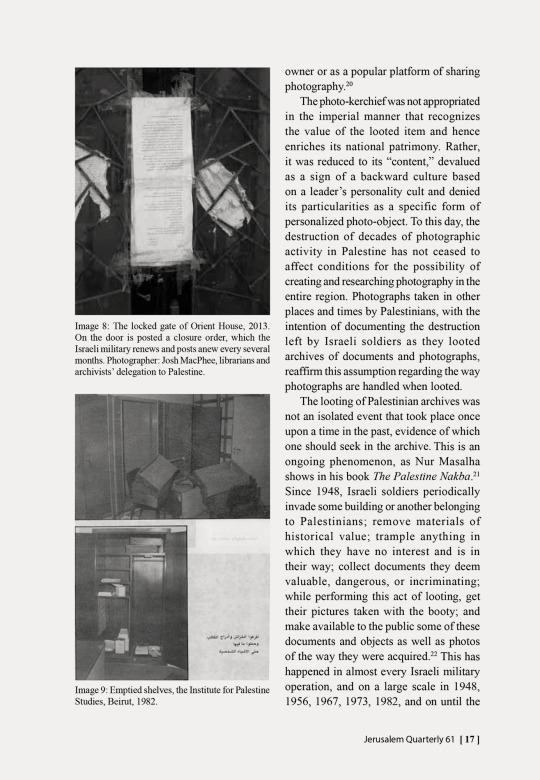
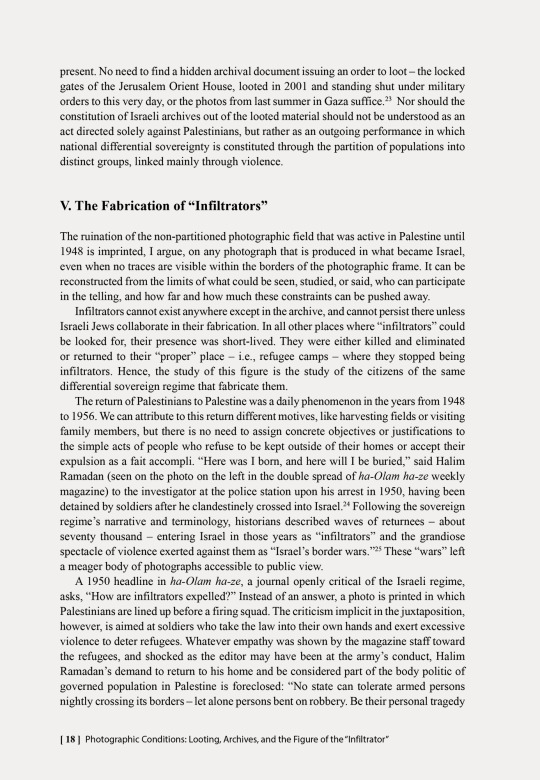
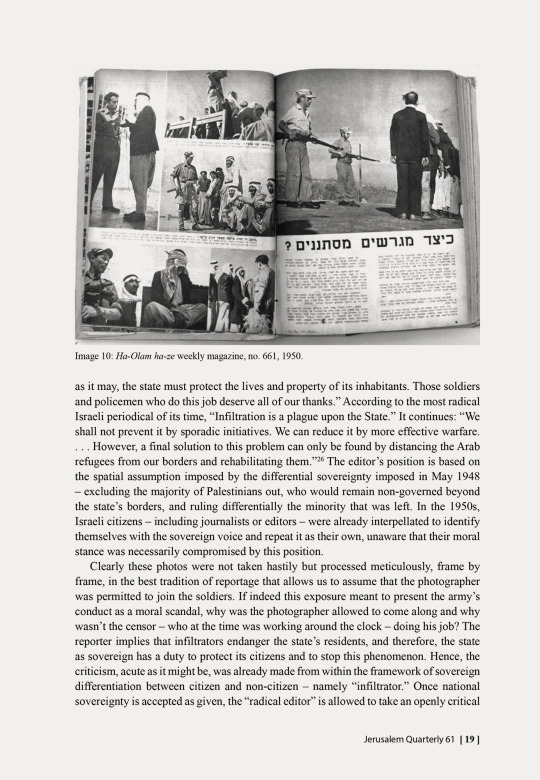
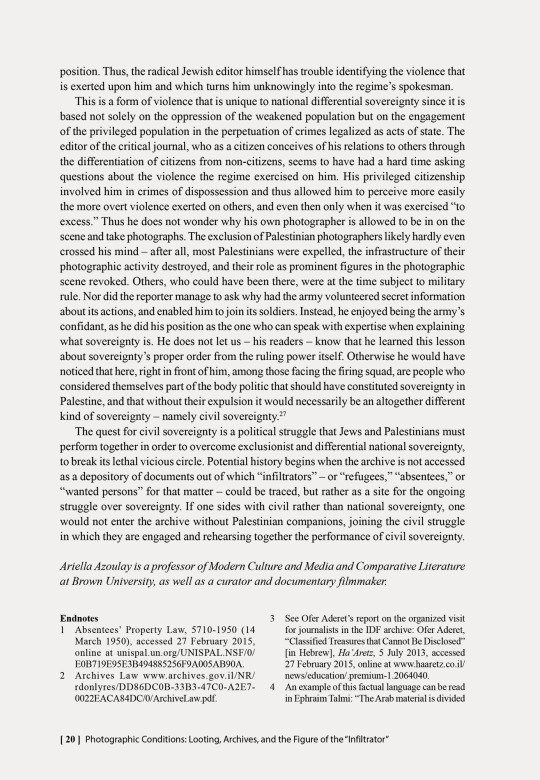

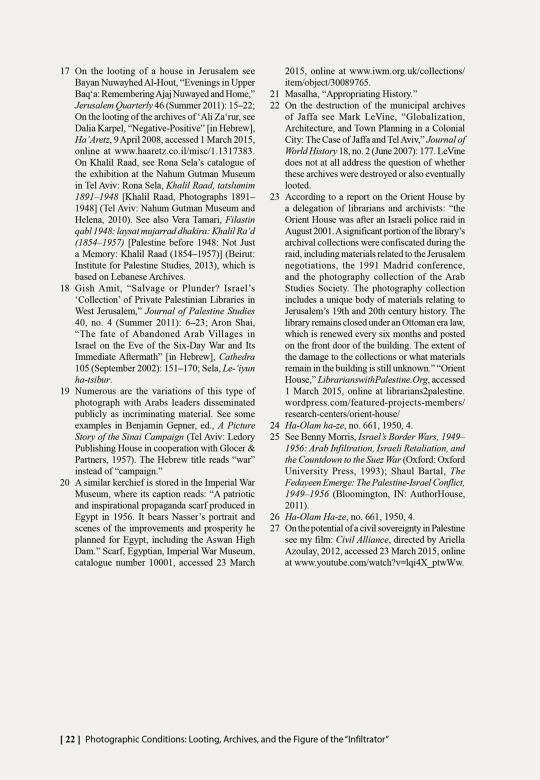
#graphic design#history#historiography#photography#journal#ariella azoulay#jerusalem quarterly#institute for palestine studies#2010s
61 notes
·
View notes
Text
Gaza: Nearly Two Decades of Israeli Incursions, Siege, and Blockade
Created 16 Oct 2023| Collection in progress
More than 16 years ago, the Israeli military put the Gaza Strip under a complete blockade—by land, air, and sea. Today, the Strip—25 miles long and 7 miles wide (twice the size of Washington, DC)—is home to 2.2 million Palestinians, most of whom are refugees from the 1948 Nakba and the 1967 war, and more than half are under the age of 18. Due to Israel’s siege, the majority of Palestinians in Gaza do not have access to basic needs such as healthcare, water, sanitation services, and electricity. According to the UN, 63 percent of the population is food insecure and is dependent on international aid; more than 80 percent live in poverty; 95 percent do not have access to clean water; and the unemployment rate is over 46 percent.
Currently, Israeli forces are conducting another incursion in Gaza in response to different Palestinian resistance groups’ attack on southern Israel. These groups have stated that this attack was launched in response to Israel’s persistent siege on Gaza and its recurring violations on the al-Aqsa Mosque compound, as well as the oppressive policies of the new extreme-right Israeli government and its normalization agreements with a rising number of states in the region. After nine days of Israel’s latest assault on Gaza, the Palestinian death toll will soon exceed 3,000 and is expected to rise as Israel continues to pummel and reduce the entire besieged enclave to rubble. This latest incursion—and by far the most brutal—is the sixth one since 2008 and the Israeli military plans a ground attack in the coming days. This collection of articles, essays, and interviews provide nuanced, vital context and background to the situation.
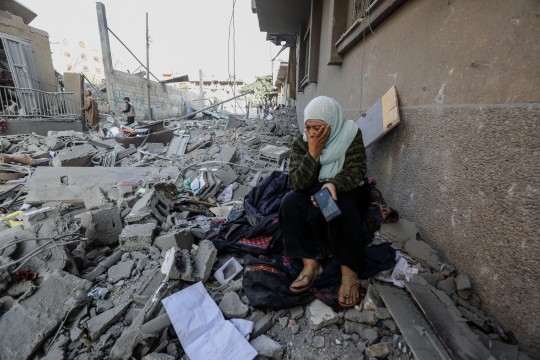
Image Caption: RAFAH, GAZA: A woman sits on a street filled with concrete pieces of destroyed buildings as Israeli airstrikes continue on the fifth day in Rafah, Gaza on October 11, 2023. (Photo by Abed Rahim Khatib/Anadolu via Getty Images)
Edited by
Rashid I. Khalidi(Columbia University)
Sherene Seikaly(University of California, Santa Barbara)
Sponsored by Institute for Palestine Studies
1 note
·
View note
Text
0 notes
Text
17/12/23 this masterlist has been completely, vetted, revamped and reformatted with free access to all reading and viewing material. It will be updated and edited periodically so please try and reblog the original post if you're able.
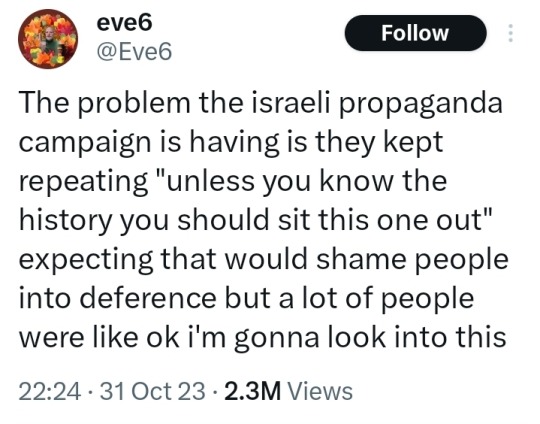
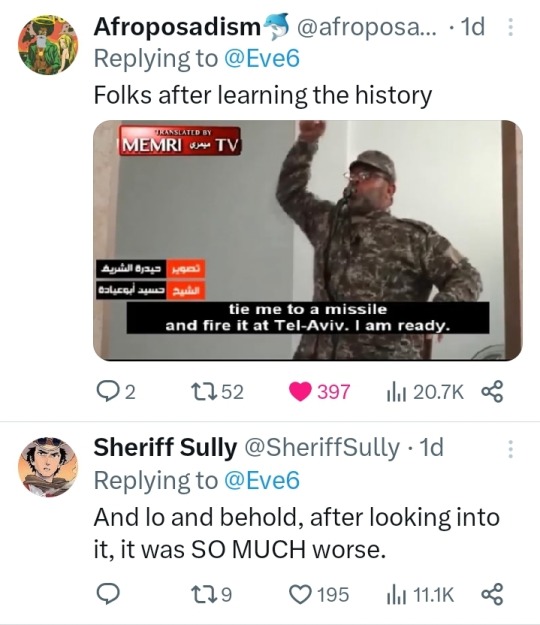

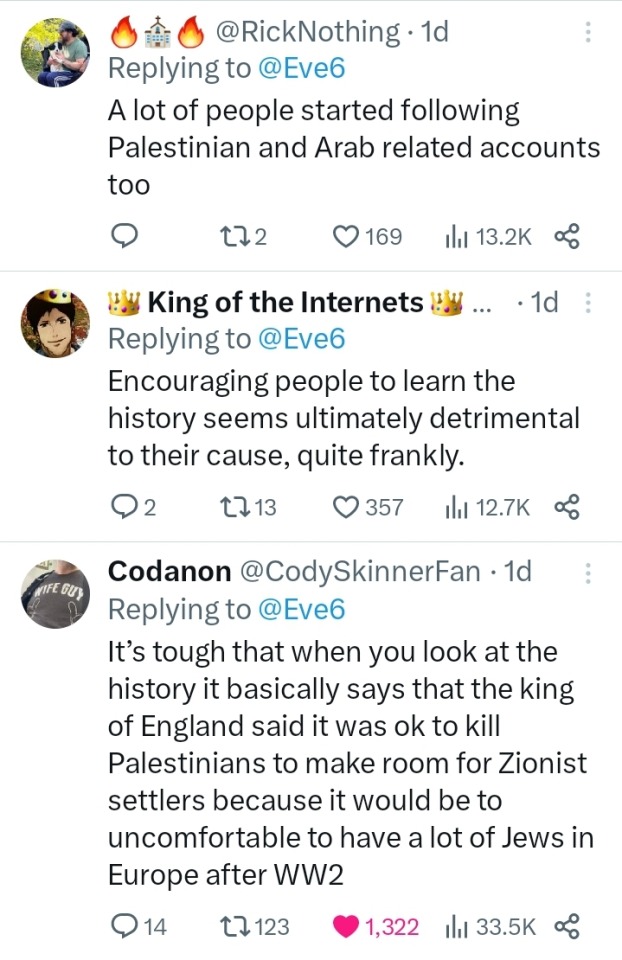
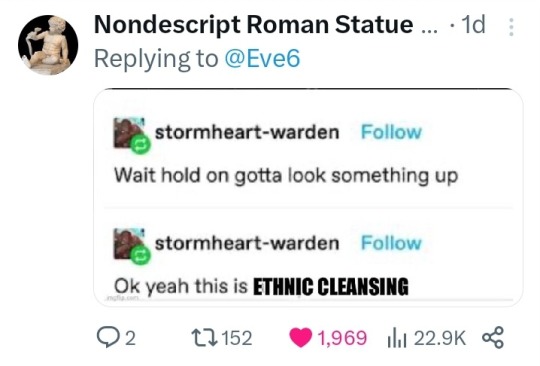
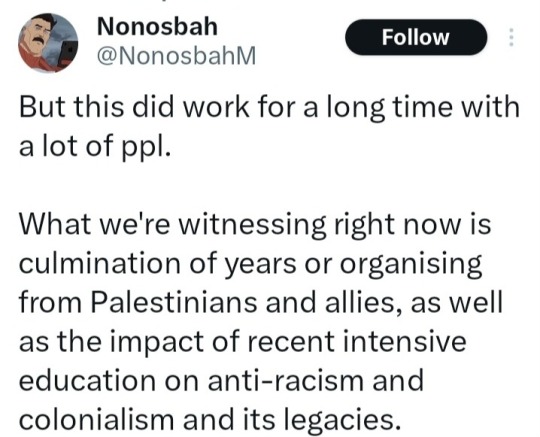
The Big Damn List Of Stuff They Said You Didn't Know
(Yes, it's a lot. Just choose your preferred medium and then pick one.)
Podcasts
Backgrounders and Quick Facts
Interactive Maps
Teach-Out Resources
Reading Material (free)
Films and Documentaries (free)
Non-Governmental Organizations
Social Media
How You Can Help
Podcasts
Cocktails & Capitalism: The Story of Palestine Part 1, Part 3
It Could Happen Here: The Cheapest Land is Bought with Blood, Part 2, The Balfour Declaration
Citations Needed: Media narratives and consent manufacturing around Israel-Palestine and the Gaza Siege
The Deprogram: Free Palestine, ft. decolonizatepalestine.com.
Backgrounders and Quick Facts
The Palestine Academy: Palestine 101
Institute for Middle East Understanding: Explainers and Quick Facts
Interactive Maps
Visualizing Palestine
Teach-Out Resources
1) Cambridge UCU and Pal Society
Palestine 101
Intro to Palestine Film + Art + Literature
Resources for Organising and Facilitating)
2) The Jadaliya YouTube Channel of the Arab Studies Institute
Gaza in Context Teach-in series
War on Palestine podcast
Updates and Discussions of news with co-editors Noura Erakat and Mouin Rabbani.
3) The Palestine Directory
History (virtual tours, digital archives, The Palestine Oral History Project, Documenting Palestine, Queering Palestine)
Cultural History (Palestine Open Maps, Overdue Books Zine, Palestine Poster Project)
Contemporary Voices in the Arts
Get Involved: NGOs and campaigns to help and support.
3) PalQuest Interactive Encyclopedia of the Palestine Question.
4) The Palestine Remix by Al Jazeera
Books and Articles
Free reading material
My Gdrive of Palestine/Decolonization Literature (nearly all the books recommended below + books from other recommended lists)
Five free eBooks by Verso
Three Free eBooks on Palestine by Haymarket
LGBT Activist Scott Long's Google Drive of Palestine Freedom Struggle Resources
Recommended Reading List
Academic Books
Edward Said (1979) The Question of Palestine, Random House
Ilan Pappé (2002)(ed) The Israel/Palestine Question, Routledge
Ilan Pappé (2006) The Ethnic Cleansing of Palestine, OneWorld Publications
Ilan Pappé (2011) The Forgotten Palestinians: A History of the Palestinians in Israel, Yale University Press
Ilan Pappé (2015) The Idea of Israel: A History of Power and Knowledge, Verso Books
Ilan Pappé (2017) The Biggest Prison On Earth: A History Of The Occupied Territories, OneWorld Publications
Ilan Pappé (2022) A History of Modern Palestine, Cambridge University Press
Rosemary Sayigh (2007) The Palestinians: From Peasants to Revolutionaries, Bloomsbury
Andrew Ross (2019) Stone Men: the Palestinians who Built Israel, Verso Books
Rashid Khalidi (2020) The Hundred Years’ War on Palestine: A History of Settler Colonialism and Resistance 1917–2017
Ariella Azoulay (2011) From Palestine to Israel: A Photographic Record of Destruction and State Formation, 1947-1950, Pluto Press
Ariella Azoulay and Adi Ophir (2012) The One-State Condition: Occupation and Democracy in Israel/Palestine, Stanford University Press.
Jeff Halper (2010) An Israeli in Palestine: Resisting Dispossession, Redeeming Israel, Pluto Press
Jeff Halper (2015) War Against the People: Israel, the Palestinians and Global Pacification
Jeff Halper (2021) Decolonizing Israel, Liberating Palestine: Zionism, Settler Colonialism, and the Case for One Democratic State, Pluto Press
Anthony Loewenstein (2023) The Palestine Laboratory: How Israel exports the Technology of Occupation around the World
Noura Erakat (2019) Justice for Some: Law and the Question of Palestine, Stanford University Press
Neve Gordon (2008) Israel’s Occupation, University of California Press
Joseph Massad (2006) The Persistence of the Palestinian Question: Essays on Zionism and the Palestinians, Routledge
Memoirs
Edward Said (1986) After the Last Sky: Palestine Lives, Columbia University PEdward Saidress
Edward Said (2000) Out of Place; A Memoir, First Vintage Books
Mourid Barghouti (2005) I saw Ramallah, Bloomsbury
Hatim Kanaaneh (2008) A Doctor in Galilee: The Life and Struggle of a Palestinian in Israel, Pluto Press
Raja Shehadeh (2008) Palestinian Walks: Into a Vanishing Landscape, Profile Books
Ghada Karmi (2009) In Search of Fatima: A Palestinian Story, Verso Books
Vittorio Arrigoni (2010) Gaza Stay Human, Kube Publishing
Ramzy Baroud (2010) My Father Was a Freedom Fighter: Gaza's Untold Story, Pluto Press
Izzeldin Abuelaish (2011) I Shall Not Hate: A Gaza Doctor’s Journey on the Road to Peace and Human Dignity, Bloomsbury
Atef Abu Saif (2015) The Drone Eats with Me: A Gaza Diary, Beacon Press
Anthologies
Voices from Gaza - Insaniyyat (The Society of Palestinian Anthropologists)
Letters From Gaza • Protean Magazine
Salma Khadra Jayyusi (1992) Anthology of Modern Palestinian Literature, Columbia University Press
ASHTAR Theatre (2010) The Gaza Monologues
Refaat Alreer (ed) (2014) Gaza Writes Back, Just World Books
Refaat Alreer, Laila El-Haddad (eds) (2015) Gaza Unsilenced, Just World Books
Cate Malek and Mateo Hoke (eds)(2015) Palestine Speaks: Narrative of Life under Occupation, Verso Books
Jehad Abusalim, Jennifer Bing (eds) (2022) Light in Gaza: Writings Born of Fire, Haymarket Books
Short Story Collections
Ghassan Kanafani, Hilary Kilpatrick (trans) (1968) Men in the Sun and Other Palestinian Stories, Lynne Rienner Publishers
Ghassan Kanafani, Barbara Harlow, Karen E. Riley (trans) (2000) Palestine’s Children: Returning to Haifa and Other Stories, Lynne Rienner Publishers
Atef Abu Saif (2014) The Book of Gaza: A City in Short Fiction, Comma Press
Samira Azzam, Ranya Abdelrahman (trans) (2022) Out Of Time: The Collected Short Stories of Samira Azzam
Sonia Sulaiman (2023) Muneera and the Moon; Stories Inspired by Palestinian Folklore
Essay Collections
Edward W. Said (2000) Reflections on Exile and Other Essays, Harvard University Press
Salim Tamari (2008) Mountain against the Sea: Essays on Palestinian Society and Culture, University of California Press
Fatma Kassem (2011) Palestinian Women: Narratives, histories and gendered memory, Bloombsbury
Ramzy Baroud (2019) These Chains Will Be Broken: Palestinian Stories of Struggle and Defiance in Israeli Prisons, Clarity Press
Novels
Sahar Khalifeh (1976) Wild Thorns, Saqi Books
Liyana Badr (1993) A Balcony over the Fakihani, Interlink Books
Hala Alyan (2017) Salt Houses, Harper Books
Susan Abulhawa (2011) Mornings in Jenin, Bloomsbury
Susan Abulhawa (2020) Against the Loveless World, Bloomsbury
Graphic novels
Joe Sacco (2001) Palestine
Joe Sacco (2010) Footnotes in Gaza
Naji al-Ali (2009) A Child in Palestine, Verso Books
Mohammad Sabaaneh (2021) Power Born of Dreams: My Story is Palestine, Street Noise Book*
Poetry
Fady Joudah (2008) The Earth in the Attic, Sheridan Books,
Ghassan Zaqtan, Fady Joudah (trans) (2012) Like a Straw Bird It Follows Me and Other Poems, Yale University Press
Hala Alyan (2013) Atrium: Poems, Three Rooms Press*
Mohammed El-Kurd (2021) Rifqa, Haymarket Books
Mosab Abu Toha (2022) Things You May Find Hidden in My Ear: Poems from Gaza, City Lights Publishers
Tawfiq Zayyad (2023) We Are Here to Stay, Smokestack Books*
The Works of Mahmoud Darwish
Poems
Rafeef Ziadah (2011) We Teach Life, Sir
Nasser Rabah (2022) In the Endless War
Refaat Alareer (2011) If I Must Die
Hiba Abu Nada (2023) I Grant You Refuge/ Not Just Passing
[All books except the ones starred are available in my gdrive. I'm adding more each day. But please try and buy whatever you're able or borrow from the library. Most should be available in the discounted Free Palestine Reading List by Pluto Press, Verso and Haymarket Books.]
Human Rights Reports & Documents
Information on current International Court of Justice case on ‘Legal Consequences arising from the Policies and Practices of Israel in the Occupied Palestinian Territory, including East Jerusalem’
UN Commission of Inquiry Report 2022
UN Special Rapporteur Report on Apartheid 2022
Amnesty International Report on Apartheid 2022
Human Rights Watch Report on Apartheid 2021
Report of the United Nations Fact-Finding Mission on the Gaza Conflict’ 2009 (‘The Goldstone Report’)
Advisory Opinion on the Legal Consequences of the Construction of a Wall in the Occupied Palestinian Territory, International Court of Justice, 9 July 2004
Films
Documentaries
Jenin, Jenin (2003) dir. Mohammed Bakri
Massacre (2005) dir. Monica Borgmann, Lokman Slim, Hermann Theissen
Slingshot HipHop (2008) dir. Jackie Reem Salloum
Waltz with Bashir (2008) dir. Ari Folman † (also on Amazon Prime)
Tears of Gaza (2010) dir. Vibeke Løkkeberg (also on Amazon Prime)
5 Broken Cameras (2011) dir. Emad Burnat (also on Amazon Prime)
The Gatekeepers (2012) dir. Dror Moreh (also on Amazon Prime)
The Great Book Robbery (2012) | Al Jazeera English
Al Nakba (2013) | Al Jazeera (5-episode docu-series)
The Village Under the Forest (2013) dir. Mark J. Kaplan
Where Should The Birds Fly (2013) dir. Fida Qishta
Naila and the Uprising (2017) (also on Amazon Prime)
GAZA (2019) dir. Andrew McConnell and Garry Keane
Gaza Fights For Freedom (2019) dir. Abby Martin
Little Palestine: Diary Of A Siege (2021) dir. Abdallah Al Khatib
Palestine 1920: The Other Side of the Palestinian Story (2021) | Al Jazeera World Documentary
Gaza Fights Back (2021) | MintPress News Original Documentary | dir. Dan Cohen
Innocence (2022) dir. Guy Davidi
Short Films
Fatenah (2009) dir. Ahmad Habash
Gaza-London (2009) dir. Dina Hamdan
Condom Lead (2013) dir. Tarzan Nasser, Arab Nasser
OBAIDA (2019) | Defence for Children Palestine
Theatrical Films
Divine Intervention (2002) | dir. Elia Suleiman (also on Netflix)
Paradise Now (2005) dir Hany Abu-Assad (also on Amazon Prime)
Lemon Tree (2008) (choose auto translate for English subs) (also on Amazon Prime)
It Must Be Heaven (2009) | dir. Elia Suleiman †
The Promise (2010) mini-series dir. Peter Kosminsky (Part 1, Part 2, Part 3, Part 4)
Habibi (2011)* dir. Susan Youssef
Omar (2013)* dir. Hany Abu-Assad †
3000 Nights (2015)* dir. Mai Masri
Foxtrot (2017) dir. Samuel Maoz (also on Amazon Prime)
The Time that Remains (2019) dir. Elia Suleiman †
Gaza Mon Amour (2020) dir. Tarzan Nasser, Arab Nasser †
The Viewing Booth (2020) dir. Ra'anan Alexandrowicz (on Amazon Prime and Apple TV)
Farha (2021)* | dir. Darin J. Sallam
Palestine Film Institute Archive
All links are for free viewing. The ones marked with a star (*) can be found on Netflix, while the ones marked † can be downloaded for free from my Mega account.
If you find Guy Davidi's Innocence anywhere please let me know, I can't find it for streaming or download even to rent or buy.
In 2018, BDS urged Netflix to dump Fauda, a series created by former members of IOF death squads that legitimizes and promotes racist violence and war crimes, to no avail. Please warn others to not give this series any views. BDS has not called for a boycott of Netflix. ]
Planning to link two separate posts here listing all the books in my drive and all the films I couldn't include here. Check back for updates.
NGOs
The Boycott, Divestment, Sanctions (BDS) Movement
Medical Aid for Palestinians
Euro-Mediterranean Human Rights Monitor
Palestine Defence for Children International
Palestinian Feminist Collective
Al-Shabaka: The Palestinian Policy Network
Addameer Prisoner Support and Human Rights Association
Institute for Palestine Studies
Al Haq
Artists for Palestine
The Palestine Museum
Jewish Currents
B’Tselem
DAWN
Social Media
Palestnians on Tumblr
@el-shab-hussein
@killyfromblame
@apollos-olives
@fairuzfan
@palipunk
@sar-soor
@nabulsi
@ibtisams
@wearenotjustnumbers2
@90-ghost (is in Gaza right now. Please donate to his GFM and boost it.)
@tamarrud
Allies and advocates (not Palestinian)
@bloglikeanegyptian beautiful posts that read like op-eds
@vyorei daily news roundups
@luthienne resistance through prose
@decolonize-the-left scoop on the US political plans and impacts
@feluka
(Please don't expect any of these blogs to be completely devoted to Palestine allyship; they do post regularly about it but they're still personal blogs and post whatever else they feel like. Do not harrass them.)
Gaza journalists
Motaz Azaiza IG: @motaz_azaiza | Twitter: @azaizamotaz9 | TikTok: _motaz.azaiza (left Gaza as of Jan 23)
Bisan Owda IG and TikTok: wizard_bisan1 | Twitter: @wizardbisan
Saleh Aljafarawi IG: @saleh_aljafarawi | Twitter: @S_Aljafarawi | TikTok: @saleh_aljafarawi97
Plestia Alaqad IG: @byplestia | TikTok: @plestiaaqad (left Gaza)
Wael Al-Dahdouh IG: @wael_eldahdouh | Twitter: @WaelDahdouh (left Gaza as of Jan 13)
Hind Khoudary IG: @hindkhoudary | Twitter: @Hind_Gaza
Ismail Jood IG and TikTok: @ismail.jood (announced end of coverage on Jan 25)
Yara Eid IG: @eid_yara | Twitter: @yaraeid_
Eye on Palestine IG: @eye.on.palestine | Twitter: @EyeonPalestine | TikTok: @eyes.on.palestine
Muhammad Shehada Twitter: @muhammadshehad2
(Edit: even though some journos have evacuated, the footage up to the end of their reporting is up on their social media, and they're also doing urgent fundraisers to get their families and friends to safety. Please donate or share their posts.)
News organisations
The Electronic Intifada Twitter: @intifada | IG: @electronicintifada
Quds News Network Twitter and Telegram: @QudsNen | IG: @qudsn (Arabic)
Times of Gaza IG: @timesofgaza | Twitter: @Timesofgaza | Telegram: @TIMESOFGAZA
The Palestine Chronicle Twitter: @PalestineChron | IG: @palestinechron | @palestinechronicle
Al-Jazeera Twitter: @AJEnglish | IG and TikTok: @aljazeeraenglish, @ajplus
Middle East Eye IG and TikTok: @middleeasteye | Twitter: @MiddleEastEye
Democracy Now Twitter and IG: @democracynow TikTok: @democracynow.org
Haaretz* Twitter: @Haaretz | IG: haaretzcom
Mondoweiss IG and TikTok: @mondoweiss | Twitter: @Mondoweiss
The Intercept Twitter and IG: @theintercept
MintPress Twitter: @MintPressNews | IG: mintpress
Novara Media Twitter and IG: @novaramedia
Truthout Twitter and IG: @truthout
[*Please note that Haaretz is an Israeli Liberal Zionist newspaper and heavily propagandized against Palestine. It's included here only as a Zionist critic of the Israeli government and IDF from within Israel.]
Palestnians on Other Social Media
Mouin Rabbani: Middle East analyst specializing in the Arab-Israeli conflict and Palestinian affairs. Twitter: @MouinRabbani
Noura Erakat: Legal scholar, human rights attorney, specialising in Israeli–Palestinian conflict. Twitter: @4noura | IG: @nouraerakat | (http://www.nouraerakat.com/)
Hebh Jamal: Journalist in Germany. IG and Twitter: @hebh_jamal
Ghada Sasa: PhD candidate in International Relations, green colonialism, and Islam in Canada. Twitter: @sasa_ghada | IG: @ghadasasa48
Taleed El Sabawi: Assistant professor of law and researcher in public health. Twitter: @el_sabawi | IG
Lexi Alexander: Filmmaker and activist. Twitter: @LexiAlex | IG: @lexialexander1
Mariam Barghouti: Writer, blogger, researcher, and journalist. Twitter: @MariamBarghouti | IG: @mariambarghouti
Rasha Abdulhadi: Queer poet, author and cultural organizer. Twitter: @rashaabdulhadi
Mohammed el-Kurd: Writer and activist from Jerusalem. IG: @mohammedelkurd | Twitter: @m7mdkurd
Ramy Abdu: Founder and Chairman of the Euro-Mediterranean Human Rights Monitor. Twitter: @RamyAbdu
Subhi: Founder of The Palestine Academy website. IG: @sbeih.jpg |TikTok @iamsbeih | Twitter: @iamsbeih
Allies
Lowkey (Kareem Dennis): Rapper, activist, video and podcast host for MintPress. Twitter: @LowkeyOnline IG: @lowkeyonline
Francesca Albanese: UN Special Rapporteur on the Occupied Territories. Twitter: @FranceskAlbs
Sana Saeed: Journalist and media critic, host and senior producer at Al-Jazeera Plus. IG: @sanaface | Twitter: @SanaSaeed
Shailja Patel: Poet, playwright, activist, founding member of Kenyans For Peace, Truth and Justice. Twitter: @shailjapatel
Jairo I. Fúnez-Flores: Researcher in curriculum studies, decolonial theory, social movements. Twitter: @Jairo_I_Funez
Jack Dodson: Journalist and Filmmaker. Twitter: @JackDodson IG: @jdodson4
Imani Barbarin: Writer, public speaker, and disability rights activist. IG: @crutches_and_spice | Twitter: @Imani_Barbarin | TikTok: @crutches_and_spice
Jewish Allies
Katie Halper: US comedian, writer, filmmaker, podcaster, and political commentator. IG and Twitter: @kthalps
Amanda Gelender: Writer. Twitter: @agelender | (https://agelender.medium.com/)
Yoav Litvin: Jerusalem-born Writer and Photographer. IG and Twitter: @nookyelur | (yoavlitvin.com)
Alana Lentin: Professor of Cultural and Social Analysis at Western Sydney University. Twitter: @alanalentin
Gideon Levy: anti-Zionist Israeli journalist and activist. Twitter: @gideonle
How You Can Help Palestine
How to be an Ally 101
URGENT‼️📢: Global Strike Guide
If any links are broken let me know. Or pull up the current post to check whether it's fixed.
"Knowledge is Israel's worst enemy. Awareness is Israel's most hated and feared foe. That's why Israel bombs a university: it wants to kill openness and determination to refuse living under injustice and racism."
— Dr. Refaat Alareer, (martyred Dec 6, 2023)
From River To The Sea Palestine Will Be Free 🇵🇸🇵🇸🇵🇸
-----
Edit 1: took the first video down because turns out the animator is a terf and it links to her blog. Really sorry for any distress.
Edit 2: All recommended readings + Haymarket recommendations + essential decolonization texts have been uploaded to my linked gdrive. I will adding more periodically. Please do buy or check them out from the library if possible, but this post was made for and by poor and gatekept Global South bitches like me.
Some have complained about the memes being disrespectful. You're actually legally obligated to make fun of Israeli propaganda and Zionists. I don't make the rules.
Edit 3: "The river to the sea" does not mean the expulsion of Jews from Palestine. Believing that is genocide apologia.
Edit 4: Gazans have specifically asked us to put every effort into pushing for a ceasefire instead of donations. "Raising humanitarian aid" is a grift Western governments are pushing right now to deflect from the fact that they're sending billions to Israel to keep carpet bombing Gazans. As long as the blockades are still in place there will never be enough aid for two million people. (UPDATE: PLEASE DONATE to the Gazan's GoFundMe fundraisers to help them buy food and get out of Rafah into Egypt. E-SIMs, food and medical supplies are also essential. Please donate to the orgs linked in the How You Can Help. Go on the strikes. DO NOT STOP PROTESTING.)
Edit 5: Google drive link for academic books folder has been fixed. Also have added a ton of resources to all the other folders so please check them out.
Edit 6: Added interactive maps, Jadaliya channel, and masterlists of donation links and protest support and of factsheets.
The twitter accounts I reposted as it was given to me and I just now realized it had too many Israeli voices and almost none of the Palestinians I'm following, so it's being edited. Check back for more. I also removed sources like Jewish Voices of Peace and Breaking the Silence that do good work but have come under fair criticism from Palestinians.
Edit 7: Complete reformatting
Edit 8: Complete revamping of the social media section. It now reflects my own following list.
Edit 9: removed some more problematic people from the allies list. Remember that the 2SS is a grift that's used to normalize violence and occupation, kids. Supporting the one-state solution is lowest possible bar for allyship. It's "Free Palestine" not "Free half of Palestine and hope Israel doesn't go right back to killing them".
Edit 10: added The Palestine Directory + Al Jazeera documentary + Addameer. This "100 links per post" thing sucks.
Edit 11: more documentaries and films
Edit 12: reformatted reading list
Edit 13: had to remove @palipunk's masterlist to add another podcast. It's their pinned post and has more resources Palestinian culture and crafts if you want to check it out
#free palestine#palestine resources#palestine reading list#decolonization#israel palestine conflict#israel palestine war#british empire#american imperialism#apartheid#social justice#middle east history#MENA#arab history#anti zionism#palestinian art#palestinian history#palestinian culture#palestinian genocide#al nakba#ethnic cleansing#war crimes#racism#imperialism#colonialism#british colonialism#knee of huss#ask to tag#Youtube
72K notes
·
View notes
Text
By Antony Loewenstein, author of The Palestine Laboratory (2023)
[...] The problem in Israel isn’t solely Netanyahu. He’s the symptom of a major larger societal shift. Replacing him with another carbon copy will change little for the millions of Palestinians who live under a brutal military occupation.
One possible successor, Benny Gantz, has spent his career proudly promoting the destruction he’s caused in Gaza in previous wars.
[...] Back in 2019, I wrote for the Jewish Forward outlet in the US that anti-Palestinian racism was ubiquitous in Israel, undeniably exploding since 7 October, and Netanyahu had simply been a reflection of contemporary Israel.
A 2016 poll found that close to half of Jewish citizens wouldn’t live in the same apartment blocks as Arabs. Fast forward to early 2024 and 68 percent of Israeli Jews opposed facilitating humanitarian aid to Gaza, according to an Israeli Democracy Institute study.
This is at a time when Palestinians in Gaza are starving to death due to Israel’s deliberate policy of withholding lifesaving aid into the besieged territory.
As far back as a 2012 poll, a majority of Israeli Jews opposed voting rights for Arabs if the Jewish state annexed the West Bank, and one-third of Israelis wanted Arabs in Israel to be denied the right to vote.
In other words, apartheid was the Israeli vision for Palestine.
. . . continues on MEE (1 Apr, 2024)
6K notes
·
View notes
Note
Have you heard that the IDF used to be a terrorist group that was recognized by the US and the UN? And apparently the same terrorist group that carried out the Nakba? Basically meaning THE terrorists?...Because BOY, it sure would have helped learning that little detail earlier!
Oh yeah, the Irgun? Haganah? Lehi? All of these literal terrorist gangs made up what we know today as the IDF. Before that, they carried out terrorist attacks against the British as well as commit massacres against Palestinians such as the Deir Yassin massacre in 1948.
All of their terrorist acts are well documented and can verrrry easily be found if you look them up. For instance, the Lehi's focus was literally assassinations of British officials and the Irgun was in fact regularly described as a terrorist organisation in US media outlets, and they were all also described as "terrorist organisations" in official British and UN documents that detail their terrorist activities.
To add, the leaders of these terrorist groups later became Israel's prime ministers (David Ben-Gurion, Menahem Begin and Yitzhak Shamir).
If you're interested in learning more about this, The Institute for Palestine Studies has recently published The Roots of Zionist Terrorism, a paper that includes more info and a rundown of these gangs' most infamous terrorist acts committed against Palestinians starting the years leading up to the Nakba.
5K notes
·
View notes
Text
Jerusalem's Palestine Archaeological Museum
(Jerusalem Quarterly Issue. 91, Autumn 2022)
A fascinating read by my friend, Dr. Hamdan Taha, about Israeli military occupation through the lens of a single institution's history.
Dr. Taha is an independent researcher and former deputy minister and director general of the Palestinian Authority’s Department of Antiquities in Palestine between 1994 and 2014. He directed a series of excavations and restoration projects in Palestine, and currently is coordinator of the Palestine History and Heritage Project. He has published many books, field reports, and scholarly articles on Palestinian archaeological heritage.
0 notes
Text
PALESTINE FILM INDEX
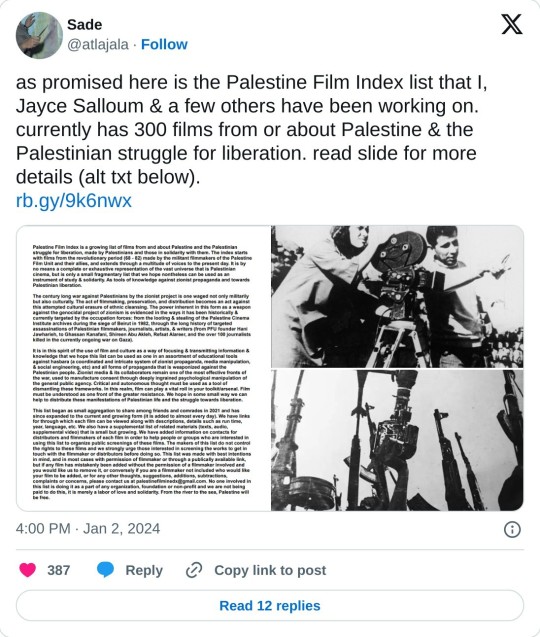
Palestine Film Index is a growing list of films from and about Palestine and the Palestinian struggle for liberation, made by Palestinians and those in solidarity with them. The index starts with films from the revolutionary period (68 - 82) made by the militant filmmakers of the Palestine Film Unit and their allies, and extends through a multitude of voices to the present day. It is by no means a complete or exhaustive representation of the vast universe that is Palestinian cinema, but is only a small fragmentary list that we hope nontheless can be used as an instrument of study & solidarity. As tools of knowledge against zionist propaganda and towards Palestinian liberation.
The century long war against Palestinians by the zionist project is one waged not only militarily but also culturally. The act of filmmaking, preservation, and distribution becomes an act against this attempted cultural erasure of ethnic cleansing. The power inherent in this form as a weapon against the genocidal project of zionism is evidenced in the ways it has been historically & currently targeted by the occupation forces: from the looting & stealing of the Palestine Cinema Institute archives during the siege of Beirut in 1982, through the long history of targeted assassinations of Palestinian filmmakers, journalists, artists, & writers (from PFU founder Hani Jawharieh, to Ghassan Kanafani, Shireen Abu Akleh, Refaat Alareer, and the over 100 journalists killed in the currently ongoing war on Gaza).
It is in this spirit of the use of film and culture as a way of focusing & transmitting information & knowledge that we hope this list can be used as one in an assortment of educational tools against hasbara (a coordinated and intricate system of zionist propaganda, media manipulation, & social engineering, etc) and all forms of propaganda that is weaponized against the Palestinian people. Zionist media & its collaborators remain one of the most effective fronts of the war, used to manufacture consent through deeply ingrained psychological manipulation of the general public agency. Critical and autonomous thought must be used as a tool of dismantling these frameworks. In this realm, film can play a vital roll in your toolkit/arsenal. Film must be understood as one front of the greater resistance. We hope in some small way we can help to distribute these manifestations of Palestinian life and the struggle towards liberation.
This list began as small aggregation to share among friends and comrades in 2021 and has since expanded to the current and growing form (it is added to almost every day). We have links for through which each film can be viewed along with descriptions, details such as run time, year, language, etc. We also have a supplemental list of related materials (texts, audio, supplemental video) that is small but growing. We have added information on contacts for distributors and filmmakers of each film in order to help people or groups who are interested in using this list to organize public screenings of these films. The makers of this list do not control the rights to these films and we strongly urge those interested in screening the works to get in touch with the filmmaker or distributors before doing so. This list was made with best intentions in mind, and in most cases with permission of filmmaker or through a publically available link, but if any film has mistakenly been added without the permission of a filmmaker involved and you would like us to remove it, or conversely if you are a filmmaker not included who would like your film to be added, or for any other thoughts, suggestions, additions, subtractions, complaints or concerns, please contact us at [email protected]. No one involved in this list is doing it as a part of any organization, foundation or non-profit and we are not being paid to do this, it is merely a labor of love and solidarity. From the river to the sea, Palestine
#this is incredible#palestinian cinema#palestine film index#link on title!!#world cinema#film#dailyworldcinema#albertserra
2K notes
·
View notes
Text
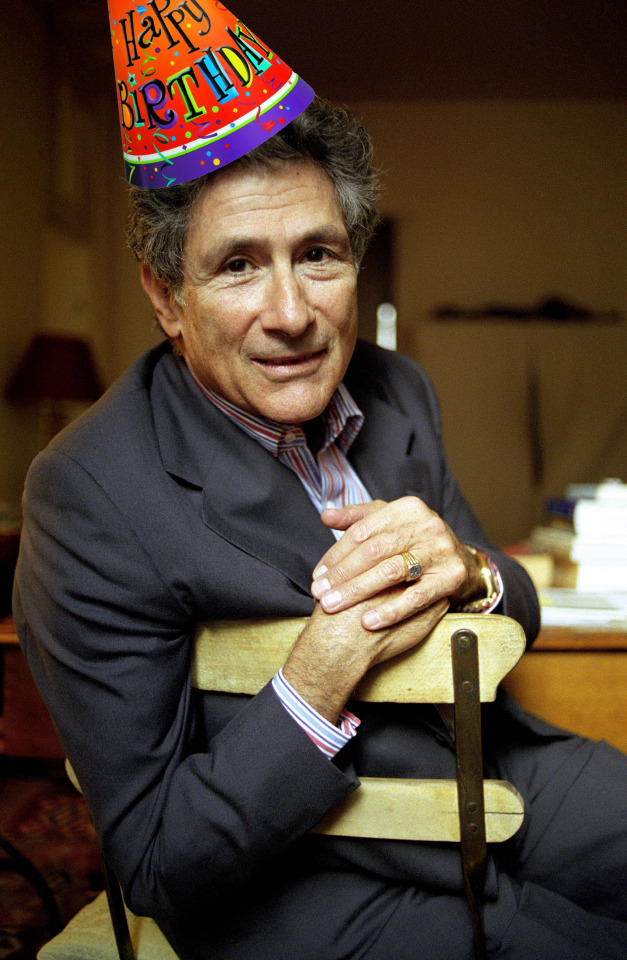
Happy birthday, Edward Said! (November 1, 1935)
A highly influential Palestinian academic, author, and activist, Edward Said was born in Jerusalem to Christian Palestinian parents. After receiving his education, Said began a teaching career at Columbia University, and would also teach at institutions including Stanford and Yale. A prolific academic, Said also contributed editorially to publications including the Arab Studies Quarterly and as the president of the Modern Language Association. Said is best known as a cultural critic through such books as Orientalism and Culture and Imperialism, the former of which, his best-known work, laid out his critique of European and American perceptions of "the East," and those perceptions' link with imperialism and colonialism. He also advocated for the Arab and Palestinian perspective on the issue of Palestine, and from 1977 to 1991 Said served on the Palestinian National Council, where he critiqued the Oslo Accords for not establishing an independent State of Palestine. He died in 2003 in New York City.
"Every single empire in its official discourse has said that it is not like all the others, that its circumstances are special, that it has a mission to enlighten, civilize, bring order and democracy, and that it uses force only as a last resort. And, sadder still, there always is a chorus of willing intellectuals to say calming words about benign or altruistic empires, as if one shouldn't trust the evidence of one's eyes watching the destruction and the misery and death brought by the latest mission civilizatrice."
2K notes
·
View notes
Note
do you know anything about native wildlife or plant life in palestine? particularly interested in primates because that's always what i'm most interested in but i'd really like to know more about what the animals and plants native to the land are like. what they were like pre israeli occupation and what sort of animal and plant life will need repairing when palestine is free. i hear a lot about the people and the human palestinian culture and it's wonderful but it's difficult for me to find anything regarding nonhuman life and i would like to learn more about it.
Honestly, the topic of Palestinian wildlife and its intersection with colonialism has been something that has increased a lot over the past couple of years. I can't offer anything about primate species (Palestine doesn't have any) but we do have lots and lots of very cool native animals like Gazelle and Caracal and Sand foxes and lots of bats and gerbils and snakes.
The Palestine Wildlife Society actually has a website with lists of all the animals found in Palestine and what level of conservation status they are at (plus the Arabic names): https://www.wildlife-pal.org/en
The Palestinian Central Bureau of Statistics also reported back in 2012 that:
There are about 51,000 living species (flora and fauna) in historical Palestine, constituting approximately 3% of global biodiversity.
In the West Bank and Gaza Strip there are an estimated 30,904 animal species, consisting of an estimated 30,000 invertebrates, 373 birds, 297 fish, 92 mammals, 82 reptiles, and 5 amphibians. Recent studies on birds in Palestine indicated that there are 373 species, which represent 23 Orders, 69 families, 21 Subfamilies, and 172 genera. The country also hosts 2,850 species of plants from 138 families.
And also added in 2014:
Israeli Violations are the main causes of Biodiversity deterioration
Based on 2012 data from ARIJ Research Institute, the Expansion and Annexation Wall has a total length of about 780 kilometers, of which 61% has been completed. The route of the Wall has isolated 680 km2 of Palestinian land between the Wall and the Green Line, comprising approximately 12.0% of the West Bank. This land comprises about 454 km2 of agricultural, pasture land and open areas, 117 km2 that were confiscated for Israeli settlements and military bases, 89 km2 of forest and 20 km2 Palestinian built-up land.
During 2013, more than eight thousand dunums of land were confiscated from Palestinians and more than 15 thousand horticultural trees were destroyed, causing considerable damage to the Palestinian environment and biodiversity.
The Israeli settlements and military bases also contribute in the biodiversity deterioration since there were 482 Israeli settlements and military bases in the West Bank at the end of 2013 contained around 563,546 settlers at the end of 2012.
Climate change is the most important natural factor that contributes to biodiversity degradation in Palestine. More animal and plant species have become under serious threat of becoming rare due to low rainfall, high temperatures, and the changing characteristics of the four seasons, in which drought is creeping into winter and spring.
The mountain Gazelle is currently endangered and this is due mostly to the building of roads and fences as well as predation and collisions with cars (the article also references the building of housing units in Mitzpeh Nafto'ah, which one of the areas where, in 2012, Israeli developers wanted to 'build up Jerusalem'). As of 2015, there were around 2,000 identified Gazelles within the Palestinian territories and historic Palestine. The mountain Gazelle look like this:
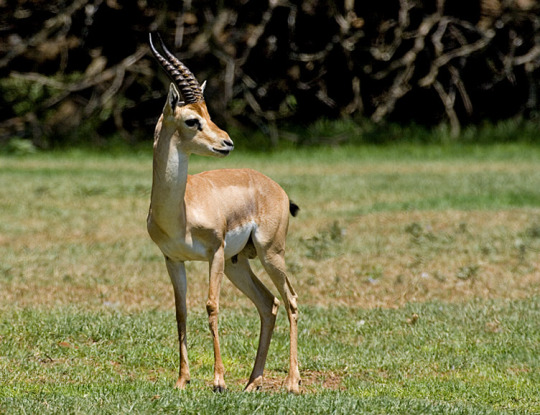
There have also been efforts for plant conservation in Palestine like the Iris Atrofusca, which has an extremely fragile population and is found almost exclusively within Palestine - a botanical garden was established for this particular Iris in the North Eastern Slopes of Palestine and in 2021, 120 clones of Iris Atrofusca were planted. Here is what they look like:

(also very interesting, sheep do not eat it!)
Probably most famous is the extinction of the Palestinian Crocodile, the last rhetorical circulation to 1935. Elizabeth Bentley wrote a great piece on it, you can read the full PDF on the Institute of Palestine Studies website or the edited (with permission) one published to Science for the People Magazine, I copied a segment from the latter here:
Colonial zoologists and collectors saw and appreciated Palestine’s bountiful plants and animals as objects of scientific inquiry. This scientific appreciation was inextricable from imperialist ambitions and the drive for profit. There were no wildlife protection laws in Palestine until 1924, which was after crocodiles’ likely regional extinction, and even then, the laws were loosely enforced. Colonial zoologists not only observed and wrote about Palestinian animals in their natural habitat. These zoological works were one of extraction and commodification.
Euphemistically termed processes of “collection” involved a network of human and nonhuman actors, whereby colonial zoologists hunted and killed Palestinian animals, studied them, and transported their remains overseas. Disemboweled, stuffed with wire and flax, and then displayed in glass cases, Palestinian animals were reanimated as spectacles for the viewing pleasure of museumgoers in London and Berlin.
While aligned with the broader trends in colonial zoology, the allure of the last Palestinian crocodile surpassed the confines of scientific inquiry; it adapted a symbolic, even mythical quality. Colonial zoologists’ ongoing speculation about Palestinian crocodile extinction necessitated a degree of willful (or internalized) unknowing about Palestine and Palestinians. Colonial zoologists were heavily dependent on Palestinians’ ecological expertise. Despite this, their writings convey mistrust and condescension toward Palestinians, along with a detachment from how local populations lived alongside Palestinian ecology.
Colonial scientific literature on Palestinian animals frequently perpetuated the racist, historically inaccurate outlook of “science for the West, myth for the rest.” Yet colonialist writings on the last Palestinian crocodile reflected their own symbolic attachments and investment in mythical thinking.
So there is a lot of work to do in regard to animal and plant conservation and several extinct animals I didn't bring up here but It is a deep dive and goes a lot farther than a lot of people consider. The Palestine Wildlife Society has a massive catalog and I hope you look through it!
1K notes
·
View notes
Text
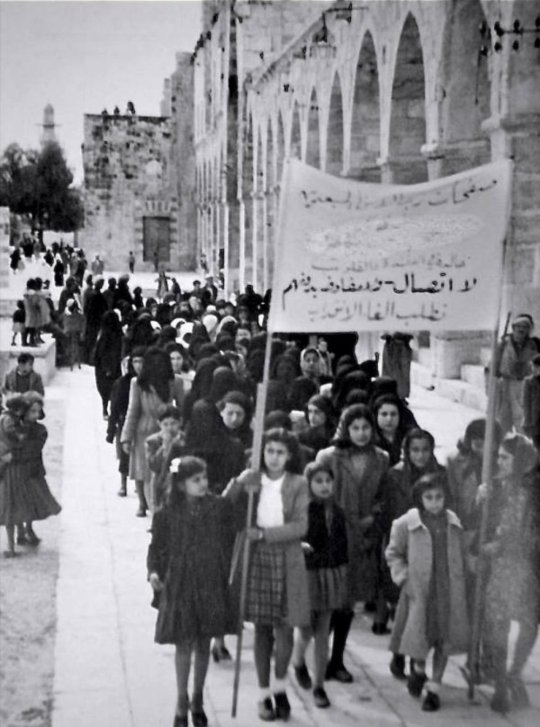
1930 protest in Jerusalem against the British Mandate by Palestinian women and girls [Zulaykha al-Shihabi (زليخة الشهابي) (front, center) is leading the protest] [«Jerusalem Story». The Interactive Encyclopedia of the Palestine Question, Institute for Palestine Studies / Palestinian Museum]
«No dialogue, no negotiations until termination [of the Mandate].»
#history#photography#zulaykha al shihabi#jerusalem story#the interactive encyclopedia of the palestine question#institute for palestine studies#the palestinian museum#1930s
32 notes
·
View notes
Note
The last post you re logged about arrestability and the Palestine Action network is something I've been thinking about a lot, and I feel really stuck on. It feels like any movement in the imperial core that wants to take actual direct action is going to find itself targeted by feds, but the ways that you can protect against that severely preclude it's ability to grow and find new recruits. Like, activism in the labor sphere can do more direct things because it doesn't have to be illegal, but I cant imagine that that will stay the case once a political labor party that's actually shutting things down. How does one make a mass movement that takes direct action but is able to prevent itself from getting shut down? I don't know, do you have any thoughts on this?
It's been done a hundred times before in the face of the same pressures, so the first order of business should be studying and learning from the experiences of successful labour movements.
Putting that aside, the key things are, in whatever words, militancy and deniability. By militancy, I mean the organisational understanding that you are in direct conflict with the bourgeois state (at a higher or lower intensity) and that your immediate priority should be making yourself immune to attack, followed only afterwards by taking offensive action. Militancy, then, means the recognition that the ultimate aim of the movement is the complete material domination and destruction of institutions that currently field armies and police networks. From the very first step, from the organisational nucleus, it needs to be understood that you are engaging in a pitched battle from within the enemies camp - which leads to the second key item, deniability.
Deniability, here, largely means compartmentalisation. Essentially every successful revolutionary movement has had a separation between the aboveground, legal struggle, and the underground, illegal struggle. To a certain degree, this is a genuinely covert or clandestine effort - undisclosed armed groups known only to a select few in the parent organisation, attributed funding through the laundering of the parent organisation. It is both essential that any armed cell is dependent entirely on the wide, integrated mass workers movement and that this cell is not actually widely known; hence, the parent organisation. If the cell were undisclosed but not integrated to a mass political organisation, it would not have revolutionary character, and be indistinguishable in practice from a common organised crime or terrorist group. It's ability to carry out correct actions would be incidental, and not self-correcting. If the cell had mass character but was not undisclosed, it would present a target to the bourgeois state and be destroyed. The strategy of asymmetric warfare is to strike at the enemy's undefended targets and to refuse to provide any defended targets for the enemy - this applies organisationally, too.
What needs to be stated, here, is that, given the connection to the mass movement, everything needs to be done only when the situation is correct. The size of a workers organisation necessary to support and supply even a single armed cell with laundered funding, safehouses, and information is extremely large, and will not be possible until a significant level of organisational base has been built and developed. Even once it is possible to support an armed cell, the political situation will very likely only warrant fairly low-intensity actions, like industrial sabotage. Again, though, the principal task of the militant - and the irregular fighter, the guerrilla in particular - is the preservation of one's own forces, over and above the destruction of the enemy. In real practice, there is no overabundance of caution, only hesitation - and the way to consistently and repeatedly carry out simple acts of industrial sabotage is by having three people work with the support of thirty-thousand. There can and must be a continuum of support, of different levels of action, between simply 'protest-organiser who pays dues to the aboveground labour organisation', to 'union salt who is a source of information on a worksite', to 'directly involved in organising and carrying out illegal acts'. The key metric for correct connection between the underground and aboveground sides of the movement is: if the actions of the underground were revealed, the mass base of the aboveground should be in support of it. The purpose of underground organising is not to go ahead of the people and start shooting cops (until the struggle has escalated to that intensity, and people are demanding that type of protection), it is to avoid providing a target for the bourgeois state.
At the higher levels of struggle, the existence of the underground becomes an open secret, which, with proper growth, coincides with the underground reaching a size and strength that it can begin to take up the mantle of the mass movement itself, and effectively transform itself into the parent organisation of the aboveground legal struggle. Until then, the model is that of a large political party leading a mass movement in every type of legal and semi-legal action under the sun (in strikes, civil unrest, and parliamentary campaigns), fiercely supporting those who do break the law (through legal and bail support, public campaigns, and protection), while the types of illegal actions the movement needs are carried out covertly.
TL;DR: Build a mass movement, or all you'll get are ecoterrorists and activists in prison.
463 notes
·
View notes
Text
As the Israeli military prepares to ramp up its genocidal assault on Gaza, every message that Palestinians manage to transmit may be the last.
The team at The Institute for Palestine Studies has been translating and publishing these messages so that the world can see the humanity buried under the rubble, and the spirit of resistance that has, does, and will continue to animate the Palestinian struggle.
To help maximize their reach, we are republishing these messages here, and will continue to update this page as more come in.
From the river to the sea, Palestine will be free.
511 notes
·
View notes
Text
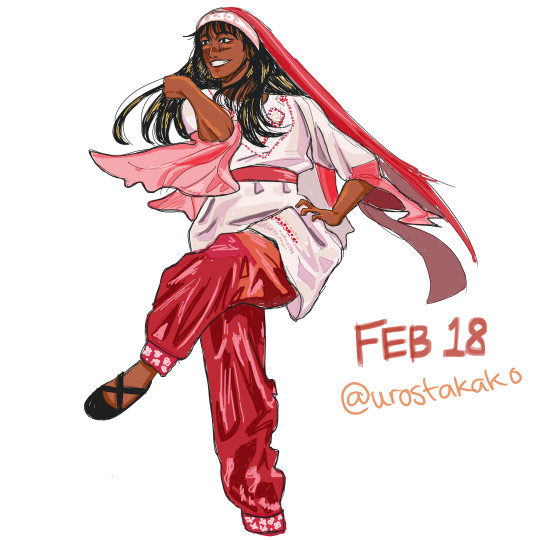
Utahime dancing Dabke !! id in alt - as always, from the river to the sea, palestine will be free
Embedded within the heart and soul of the Palestinian people, the dabke – an ancient folkloric dance native to the Levant – transcends mere artistic expression, serving as a resolute act of defiance against the Zionist state's occupation. With each rhythmic stomp and synchronised movement, Palestinians reclaim their cultural identity, defiantly asserting their existence and resilience in the face of systemic oppression, while igniting a flame of resistance that resonates with generations past and present, affirming their connection with the land.
- Fadila Khalid, Dance & Defiance: Dabke as an Emblem of Resilience in Palestine
below are resources for information on palestine and donations !! and reference photo is below that
donation masterpost by @/nabulsi:
info:
An Indicative Archive: Salvaging Nakba Documents | Institute for Palestine Studies (palestine-studies.org)
A Threshold Crossed: Israeli Authorities and the Crimes of Apartheid and Persecution | HRW
Institute for Palestine Studies | (palestine-studies.org)
Free Ebooks for a Free Palestine! | HaymarketBooks.org
Palestinian Culture - Anera
reference:
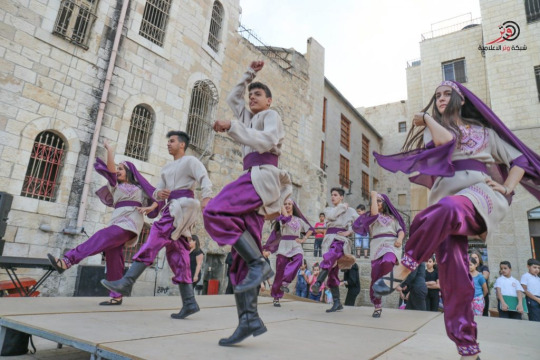
#had meant to post this on february 18 for her bday but here we are#i had a thought you see. utahime is a dancer. thus became the natural course of things.#also i wanted to participate in jjk for gaza but unfortunately i didnt have time to do art like that. or to do art at all 💀#either way i hope this counts for something. dabke dancing utahime is so true i hope you see my vision !!!#also the id is really bad please if anyone has a better one with proper terms i'd be grateful 😭#anywayz#free palestine#palestine#palestine art#free gaza#utahime iori#jujutsu kaisen#jjk#jjk fanart#hanancouldyounot#hanancouldyoudraw
202 notes
·
View notes
Note
I think a large problem with how we got to this stage of "man is gender neutral" discourse is that a lot of queer people refuse to engage with feminism. I've been seeing it brought up a lot recently, but it's true. Someone who doesn't see a problem with referring to a trans woman as "dude" probably also doesn't believe in patriarchy to begin with. We need to start doing feminism 101 on tumblr again.
I think this is true and I also think this issue extends to the fact that white liberal queerness is the societally accepted conception of lgbtq issues broadly - the fact that pride flags litter the windowsills of small businesses and banks, that lgbtq merchandise is its own market, that western conceptions of gayness and especially transness are the internationally imposed norm (eg, we are pathological exceptions to cishetero society and should be accepted on the grounds that we are scientifically proven to be legitimate by medical and psychiatric institutions, presented with an awkward flair of “okay so we’re not saying being transgender is a mental illness, but it is caused by a mental illness” + framing of gay people as “they’re just like straight people! they can get married and have children just like you!”). Many many queer people of colour have pointed out how much this predominate western framing of lgbtq identity as a “white person thing” (partially because white queer people are just as racist as non-queer white people, also because of aforementioned western imperialism) puts them at odds with their own communities, giving people in those communities a “rational” reason to oppose lgbtq rights on the grounds of resisting western imperialism. Israel’s pinkwashing is a particularly instructive and stark example of this, positioning lgbtq freedom as being contingent on genociding and destroying Palestine - this doesn’t mean it’s okay to be homophobic obviously, but this sort of imperial imposition of queerness as part of the package of western domination creates the conditions for “rationally opposing” lgbtq rights and equality within colonized communities and ultimately causes intersecting levels of harm for lgbtq people in those communities. You can read decolonizing trans/gender 101 by b binaohan if you want more on the subject, I’ve only read the intro so far but it was very instructive (thank you @/molsno for spreading this link around! - she also has a post with a bunch of transfeminist writings if you want more of that). There's also this video by FD Signifier about Dave Chappelle's transphobia that talks about anti-Blackness in white trans/queer spaces and the intense homophobia and transphobia Black lgbtq people face as a result of this that I found insightful if you want to listen to something instead
ANYWAY, all to say - I think the larger problem is that queerness in western contexts (which tumblr is firmly situated in) is overwhelmingly white and liberal, which means that even if these spaces were to incorporate feminist frameworks in their analysis of oppression, they would be incorporated as liberal feminist frameworks, which are fundamentally transmisogynistic and racist, and fundamentally attached to the imperial project of the west (I recently read this article called Beyond the Coloniality of Gender by Alex Adamson discussing some of the problems with western feminism. they demonstrate this through a case study on western feminist objections to genital cutting in certain African countries + analysis of decolonial trans and intersex feminisms more broadly - if you click "show document" in the upper right hand corner of the page I linked it allows you to access the full article).
I’ve always struggled to articulate the exact issue we're discussing, because at a certain point a lack of knowledge is not to be blamed -the larger issue at hand is that the western political + economic apparatus has incorporated queer assimilation into its project. This does not mean that queer people in the west are safe from homophobia or transphobia (see: current transphobic hysteria across North America and UK in particular), but it does mean that white western queer people have incredible political and rhetorical leverage to dominate these conversations using white liberal analytical frameworks, which can only lead to transmisogynist and white supremacist conclusions about the nature of oppression. I think the only way out of these path-dependent "everyone is oppressed by patriarchy" conversations is a larger decolonial political and social project - part of which necessarily incorporates feminist analysis, but feminist analyses that are decolonial, marxist, and transfeminist in nature, and the only way these frameworks can be comprehensively adopted is through a larger decolonial turn
117 notes
·
View notes
Note
Hello! rly appreciating your posts, in particular the ones about GLAM... it made me curious if you or your followers happen to have any resources/literature to recommend on 2 areas of interest?:
1. Relating salvage anthropology to modern day ideas of trauma porn
2. Palestinian-led museums/archives/oral history projects/other collections or exhibitions of note. (Or if not literature, any names involved besides the few I know of like POHA/the nakba archive/the arab resource center for popular arts; the palestine museum; librarians & archivists with Palestine; activestills; forever our land; and art for gaza)
Anyway, again, thanks for all the time/work you’re putting into analysis and info dissemination <3
hello, thanks for sending this in. sooo i have like. no idea about the first one haha but i have so many for the second one.
The Institute for Palestine Studies has a bunch of scholarly articles and anaylsis about Palestine
Librarians and Archivists for Palestine is not completely Palestinian led but it's one that I'm a part of and really like, even though you already mention it.
The Palestine Museum Digital Archive is an AMAZING resource led by Palestinians in Palestine. I recommend scrolling through their intifada posters, downloading them, printing them, and hanging them around town.
The Palestinian Oral History Archive project in case people were wondering what POHA is.
The Museum of the Palestinian People in DC is really great and has a lot of digitized features.
The Palestine Museum US has a lot of books as well, based on Turtle Island.
The Arab American National Museum is not Palestinian led but I can vouch that they're a great group.
The Met has a lot of Palestinian clothing BUT.... warning in that it is very colonial in its arrangement and description and we dont super know how people got the material they have. If you want to look at the content feel free, though. Will say that Wafa Ghnaim, one of the leading experts on Tatreez in Turtle Island is working on recataloguing the Palestinian collection.
Visualizing Palestine is an infographic organization that might interest you.
The Nakba Archive for people wanting to check it out.
The Library of Congress is. Honestly it's pretty racist but it does have content if you wanna look at it.
Tirazain is a tatreez pattern library that's really cool.
There might be more that I'm forgetting but here are some just from me sitting here thinking for the past few minutes. If anyone else has any recommendations, feel free to add.
222 notes
·
View notes